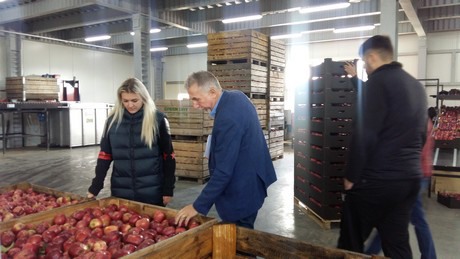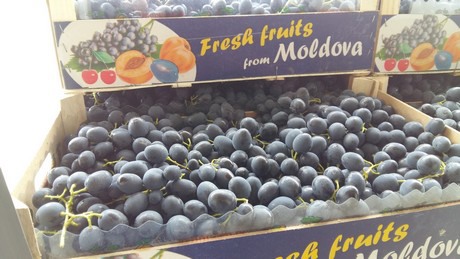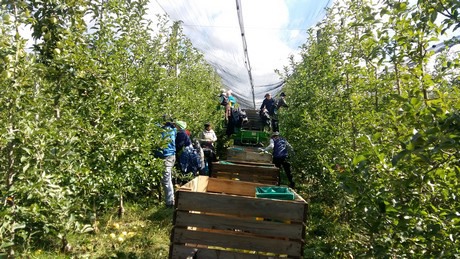When it comes to the world trade of fruit and vegetables, Moldova might not be at the top of your mind. However the country is developing fast, with some help from a couple of Dutch experts. Moldova is able to offload its produce steadily, as they have a good relationship with Russia and are not affected by the embargo that was put in place by the Russians. This won’t last forever though, and Moldova is gearing up to conquer the European markets with their fresh produce.

Piet Schotel checks on some of the produce
Piet Schotel has been working as an independent agricultural consultant for about fifteen years. His knowledge of the fruit and vegetable trade makes him valuable for exporters who work from overseas. He coaches them, teaches them the ins and outs when it comes to exporting produce to Europe, where the rules for quality are more strict than people are used to: “When looking at the companies we help, they simply don’t have the broad knowledge of the market that is required to succeed. Issues like preferred sizes, varieties and certifications are not common knowledge. So we try to train and assist these companies, both in cultivation as in the marketing of their product. Once we feel they are ready to make their final step, we take them to Fruit Logistica, where they have the chance to present their company and brand to the world. They have to do this themselves, we don’t do it for them. But we guide and assist them where we can.”

Moldova is one of the countries that Schotel currently has under his wing in the CBI Export Coaching Program. Working closely together with the local producers organization Moldova Fruct. He guides twelve companies and is grooming them to be ready for Fruit Logistica in Berlin in 2020.
Moldova is a special case, in the sense that they are allowed to export their produce to Russia as they are excluded from the embargo that is currently in place. It means they have a partner to who they can offload any produce they want. “The growers and exporters in Moldavia know that the Russia money-train isn’t going to last forever, so they try to prepare themselves for a situation where the embargo isn’t in place anymore. So they’ve started improving their orchards, which are now high intensity orchards. Their packhouses are very modern, the same goes for their cold storage. Everything is in place to start successful campaigns of export to Europe. Now all they need is the proper know-how.” Schotel explains.

When it comes to marketing its produce, Schotel feels Moldova needs to emphasize what makes it so unique: “When we ask them what sets their fruit and vegetables apart, they usually bring up the taste of their produce. The flavor is their true pride. They say the reason it’s unique is due to the location of the cultivation. They grow the produce between the Black Sea and the mountains. Combine this geographical location, the very harsh winters and the abundance of sun hours during the long summer, and the result is a different taste to the fruit and vegetables. Moldovan growers and exporters are very convinced of this trait. We are convinced this flavor is what they need to highlight whenever they come up with a marketing plan.”

Although Fruit Logistica is still a while away, Schotel is already preparing them for the huge exhibition. “Fruit Logistica is where you can present your company and produce to the world. It is the perfect place for Moldova to show how far they’ve come with their apples, plums and grapes. They actually still grow the seeded blue grapes, which isn’t very common anymore since the seedless grapes are much more popular. However after the right training, maybe they can convince Europe, maybe even the world, that there is still a place for these grapes. As a consultant I will try to assist them every step of the way, so they can do it without our help in the future.”
For more information:
Piet Schotel
Fruit Consultancy Europe
Mob: + 31 6 53381897
Email: piet@fruitconsultancy.nl
www.fruitconsultancyeurope.nl
www.cbi.eu
